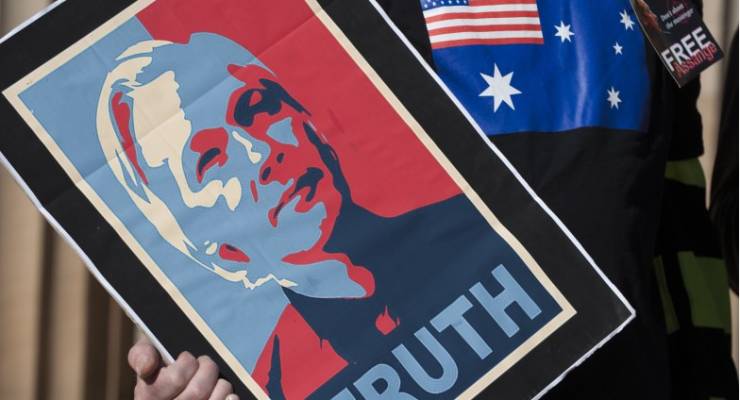
ASSANGE DENIED
WikiLeaks founder Julian Assange has had his extradition hearing delay denied, after appearing in a London court looking “gaunt, hesitant and apparently confused”.
Assange, who is trying to avoid extradition to the US to face espionage and hacking charges, appeared “unwell” during the hearing, with his legal team saying they have “substantial and significant concerns” for his health. His lawyer argued they needed more time to prepare their case against the “unprecedented” use of espionage charges against a journalist, a request that was rejected. The full five-day extradition hearing will still go ahead in February 2020 with brief interim hearings in November and December.
NOWHERE TO GO
Witness K lawyer Bernard Collaery is calling for an independent parliamentary body for defence and intelligence whistleblowers, telling The Guardian they currently have “nowhere to go” when they witness serious misconduct. Collaery says that a lack of options encourages whistleblowers to go public in dangerous ways, potentially compromising national security.
The AFP, meanwhile, has launched an inquiry into how it handles sensitive investigations following backlash over recent raids on journalists, while Prime Minister Scott Morrison is being “tested” by the Your Right to Know campaign ($), telling parliament yesterday that journalists should not be prosecuted at the “whim of politicians”.
HOME AFFAIRS AFFAIRS
Home Affairs department secretary Michael Pezzullo appeared before a Senate estimates hearing last night, confirming that ten asylum seekers are being detained in Port Moresby despite being approved for medivac transfers.
Pezzullo said the men were being held under PNG law, and had all been found not to be owed protection (though medvac transfers are available to both refugees and non-refugees). Operation Sovereign Borders head Craig Furini told the hearing that only 13 of the 135 medical-transfer detainees brought to Australia had been hospitalised ($), with none currently in hospital.
[free_worm]
THEY REALLY SAID THAT?
I’m not a member of a faction.
Anthony Albanese
The longtime NSW Labor Left figure told reporters over the weekend that he doesn’t “participate in factional activity”.
READ ALL ABOUT IT
Taxpayers funded $174m in government advertising last financial year
Labor finances in crisis as $1m ICAC bill looms ($)
Nationals deputy leader Bridget McKenzie under pressure
PM staffer with alleged links to QAnon conspiracy theorist is awaiting security clearance
John Bercow denies Boris Johnson second vote on Brexit deal
Treasurer says government has ‘no plan’ to seek GST reform without voter mandate
Labor backs trade deals despite union resistance
News Corp, QBE exit Business Council
Clive Palmer company re-applies for mine four times size of Adani’s Carmichael
Medibank to be first health insurer to make potential out-of-pocket costs publicly available
Australia slides in global wealth rankings as 124,000 millionaires disappear
New consent laws a ‘waste of time’: Lawyers ($)
MP urges ban on ‘enormously wasteful’ bunting outside polling booths
CRIKEY QUICKIE: THE BEST OF YESTERDAY
How can the media stand against the police state? Stop cooperating.
“So what could the media do to force governments to think seriously about restoring some of the basic protections lost in recent years? There’s one tactic that will alarm and enrage federal politicians who are eager to deter, and punish, unauthorised leaks: stop reporting authorised leaks. For every unauthorised leak, or act of whistleblowing, that exposes misconduct and failure within government — whether war crimes in Afghanistan, illegal spying in Timor-Leste, misconduct within the ATO, abuse of asylum seekers, NBN’s failed rollout or proposals for more spying on Australians — there’s an authorised leak designed to serve the government. This can include national security information far more damaging than what prompts AFP raids.”
Why can’t we stop the memeification of white supremacy?
“For years, the alt-right has mobilised irony, humour and memes, both as a shield against critics and as a way of disorienting outsiders trying to piece together what these people actually believe. The memes also give the movement a transgressive allure which makes it attractive to the downwardly mobile young men that are its foot soldiers. But in the end, the point where the memes end and the violence begins has become blurred to the point of irrelevance. When far-right ideas spread through the internet, Sparrow says, trying to separate irony from ideology isn’t important. ‘What matters is that the meme circulates’.”
Public housing and private trauma
“Much of my work as an advocate involves trying to bridge the gap between my Aboriginal clients and the machinery of government. It’s like translating between different languages. Except, in this instance, the words are the same; it’s the context and weighting behind them that is often vastly different. It often takes a bit of telling to explain why someone is physically incapable of paying the water bill on time or preventing property damage. The answer involves more than a century of government policy, social exclusion and the deliberate destruction of family, culture and worldview. Most of us know all this intellectually. But it doesn’t really mean anything until you sit down and listen as a person looks you in the eyes and, with complete openness, details the most appalling traumas, one after the other, until it seems barely believable that a single person could experience all that and still be here, speaking through it.”
THE COMMENTARIAT
Take it from me, media freedom is too precious to take for granted – Abdullah Ali Khil (The Age/Sydney Morning Herald): “The ability to hold power to account, and to be able to report freely on the facts that the public have the right to know, is critical to a democracy. Importantly, a free media is good for all sides: for the government, for the public, as well as for media networks. If we compromise, interfere or do anything to harm media freedom, this not only affects the public’s trust in the media, but their trust in the institutions that run our country. There are many people like me who have come to Australia from countries where we do not have the trust in media we take for granted here. That trust is so precious. If you lose it, getting it back – if you ever do – will be a long struggle. We should do all that we can to fight for it and protect it.”
ALP should have left Anthony Albanese on the shelf ($) – Troy Bramston (The Australian): “There is talk in Coalition and Labor ranks that Scott Morrison may go to an early election, in about two years, in late 2021, rather than wait until mid-2022 when an election for the House of Representatives and half the Senate normally would be due. Why? Because he knows he has Anthony Albanese’s measure. In more than five months since the election Albanese has done next to nothing to demonstrate that Labor has learned anything, changed course on policy or strategy, or put his stamp on the party in any noticeable way. His office is talking up a 1990s-style ‘headland’ speech next week. Is that it?”
What Morrison must do about the drought ($) – Renee Viellaris (The Daily Telegraph): “Time will tell whether owning an issue like drought, which can only be fixed by an act of God, is a wise move given he cannot make it rain (think Malcolm Turnbull declaring he would bring power prices down only to be undone by his signature national energy guarantee). While it’s almost impossible for Morrison to be removed from leadership by the party room, the electorate can do it very quickly in two and a half years if the current niggle that the Government is not doing enough on drought or the economy turns into throbbing political pain.”
HOLD THE FRONT PAGE

WHAT’S ON TODAY
Canberra
-
The Australian War Memorial will receive a set of military medals previously thought to have been lost over 40 years ago.
Brisbane
-
Brisbane City councillor Jonathan Sri will lead a protest against the Queensland government’s crackdown on protesting.
-
A return of subpeona is listed in the federal matter of Gold Coast mayor Tom Tate and the ABC.
Sydney
-
The Law Enforcement Conduct Commission will hold a public hearing regarding the strip search of an underage girl at the Splendour in the Grass music festival in July 2018 by NSW Police.
-
Evacuated residents of Mascot Towers will hold an AGM to decide on whether to go ahead with a multi-million dollar special levy for building repairs or to seek a commercial strate loan.
Melbourne
-
Actress Sarah Jessica Parker will attend a Business Chicks Melbourne breakfast.
-
The AFLW draft will be held.
Hobart
-
New Antarctic landing barges, destined to work on Australia’s new icebreaker RSV Nuyina, will be tested during sea-trials on Hobart’s River Derwent.
Adelaide
-
A rose garden dedication ceremony will take place at Government House, with the garden to become a living tribute to present and past Governors of South Australia.
Tokyo
-
Governor-General David Hurley will represent Australia at the Ceremony of the Enthronement of His Majesty Naruhito, the Emperor of Japan.











Labor’s sell-outs emphasise their commitment to evil and oppressive laws. Appalling impacts on us of such evil laws do not appear in its discussions. Likewise, the media too is usually happy not to point them out.
In 2017, Opposition legal affairs spokesman Mark Dreyfus stressed the committee’s findings on the Espionage and Foreign Interference Bill were bipartisan “…as we have improved all of the national security bills which the government has brought to the parliament since 2013”.
Mr Dreyfus said that the recommendations went “a long way” to addressing concerns by media organisations that ordinary journalism could be criminalised. “For instance, in relation to journalists there will be two hurdles before a journalist can be prosecuted under the new secrecy offences about classified documents,” he said. “The head of the agency where the classified documents came from will have to certify that they were properly classified and the Attorney-General will have to consent to prosecutions”. As though either would be reluctant to drive prosecution! Obviously Labor and Dreyfus ensured that the A-G can thus pressure and control journalists – never prosecute Dennis Shanahan, always prosecute Julian Assange.
Media organisations are very happy with evil and oppressive laws for the rest of us as long as they have exemptions. Past misconduct or abuse of power by oppression organisations such as ASIO has received minimal reporting and no censure from “The Australian”, Australia’s most dominant daily. Likewise, governments are still allowed by their fellows and by a sycophantic media a remarkable degree of freedom to refuse to discuss “intelligence” issues.